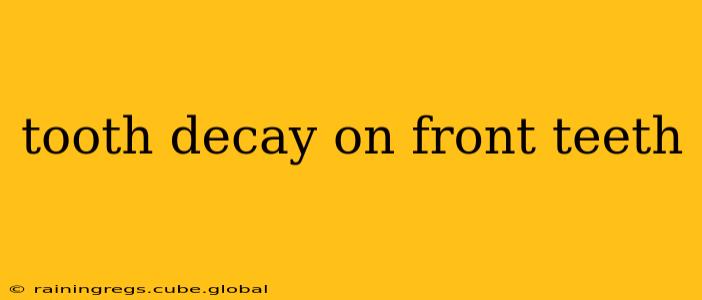Tooth decay, also known as dental caries or cavities, is a common problem affecting people of all ages. While it can occur anywhere in the mouth, decay on the front teeth is particularly noticeable and can impact self-esteem. This comprehensive guide will explore the causes of tooth decay on front teeth, effective prevention strategies, and available treatment options.
What Causes Tooth Decay on Front Teeth?
The primary cause of tooth decay is the interaction of bacteria, sugar, and teeth. Bacteria in plaque—a sticky film that constantly forms on teeth—feed on sugars from food and drinks. This process produces acids that attack the tooth enamel, leading to demineralization and eventual decay. Front teeth, particularly incisors, can be more susceptible due to their prominent position and potential for increased exposure to sugars and acids.
Factors Increasing Risk of Front Tooth Decay:
- Poor Oral Hygiene: Insufficient brushing and flossing allow plaque to accumulate, increasing the risk of decay.
- Sugary Diet: Frequent consumption of sugary foods and drinks provides ample fuel for cavity-causing bacteria. Sticky sweets, like candy and gummies, are particularly problematic as they linger on the teeth.
- Acidic Foods and Drinks: Regular consumption of acidic beverages like soda, juice, and even certain fruits can erode enamel, making teeth more vulnerable to decay. This is especially relevant for front teeth due to their exposure.
- Dry Mouth: Saliva plays a crucial role in neutralizing acids and protecting teeth. Dry mouth (xerostomia) can increase the risk of decay. This can be caused by medications, medical conditions, or even mouth breathing.
- Genetics: Some individuals may be genetically predisposed to more susceptible enamel.
- Bruxism (Teeth Grinding): Grinding or clenching teeth can wear down enamel, exposing the dentin and making the teeth more prone to decay.
- Poor Dental Restoration: A poorly fitted or damaged filling, crown, or other restoration can create spaces where bacteria can accumulate and cause decay.
How Can I Prevent Tooth Decay on My Front Teeth?
Prevention is key to maintaining healthy front teeth. A proactive approach that includes consistent oral hygiene, a balanced diet, and regular dental checkups can significantly reduce your risk of decay.
Effective Prevention Strategies:
- Brush and Floss Regularly: Brush your teeth twice a day with fluoride toothpaste for at least two minutes each time. Floss daily to remove plaque and food particles from between teeth and along the gumline.
- Limit Sugary Foods and Drinks: Reduce your intake of sugary snacks, candies, and sodas. If you do consume sugary items, rinse your mouth with water afterward.
- Choose Fluoridated Toothpaste and Mouthwash: Fluoride helps strengthen enamel and makes teeth more resistant to decay.
- Drink Plenty of Water: Staying hydrated helps to wash away food particles and neutralize acids.
- Eat a Balanced Diet: A diet rich in fruits, vegetables, and whole grains supports overall oral health.
- Regular Dental Checkups: Visit your dentist for regular checkups and professional cleanings. Early detection and treatment of decay can prevent more extensive damage.
What are the Treatment Options for Front Tooth Decay?
The treatment for tooth decay on front teeth depends on the severity of the decay. Early detection is crucial for minimizing the extent of treatment required.
Treatment Options:
- Fluoride Treatments: Your dentist may apply fluoride treatments to strengthen enamel and reverse early stages of decay.
- Fillings: For more extensive decay, fillings (often made of composite resin for aesthetic reasons on front teeth) are used to restore the tooth structure.
- Inlays/Onlays: These are indirect restorations, made in a lab, that cover a larger area of the tooth than fillings.
- Crowns: If the tooth is significantly damaged, a crown may be necessary to protect and restore the tooth.
- Root Canal Treatment: In cases of severe decay reaching the pulp (nerve), a root canal may be required to save the tooth.
- Extraction: In extreme cases, tooth extraction may be necessary if the tooth is beyond repair.
What if I have a sensitive front tooth?
Sensitivity in a front tooth can indicate decay, particularly if it's accompanied by pain when eating or drinking hot or cold items. It could also stem from gum recession exposing the tooth's root. A dentist can properly diagnose the cause and recommend appropriate treatment.
How can I avoid getting cavities in my front teeth?
Regular brushing, flossing, and a healthy diet are the cornerstones of cavity prevention. Minimizing sugary and acidic foods and drinks, and using fluoride toothpaste, are crucial. Visiting your dentist for regular checkups and professional cleanings is equally important for early detection and prevention.
Are front teeth more prone to decay?
While any tooth can decay, front teeth might be more noticeable when decay occurs due to their prominent location. Their susceptibility is mainly linked to increased exposure to food and drinks.
This guide offers a comprehensive overview of tooth decay on front teeth. However, it's crucial to consult with your dentist for personalized advice and treatment based on your individual needs. Early intervention is key to preserving your oral health and maintaining a beautiful smile. Remember, prevention is always better than cure!
